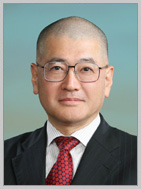HOME > Message
Message
Global COE Leader
Department of Biomedical Engineering, Graduate School of Biomedical Engineering
Takami Yamaguchi

Nanotechnology will undoubtedly become one of the most important fields of the 21st century. Amongst its many possible applications, biomedical engineering is one of the most promising. The advancement of biology, in combination with information technology, has opened a new era in medicine that will be the basis of sophisticated diagnostic and revolutionary therapeutic products. Nanotechnology, combined with biomedical engineering, will further reinforce this trend.
Development of biomedical engineering is particularly important in the East Asian Pacific Rim region due to the rapid changes in the composition of its population. The most rapidly developing countries of the 20th century in this area are all now confronting serious problems with ageing societies that require innovations in health care and medicine. This is not, however, simply a burden to society as is often suggested; the challenge of dealing with ageing should be looked upon as having the potential to build a new type of economy and industry. We at Tohoku University are now leading the new age by initiating the Global Centre of Excellence Program, the メGlobal Nano-Biomedical Engineering Education and Research Network Centreモ based on this recognition.
Although it is frequently misunderstood that engineering and biology are very different fields of science, they are historically close and share a common basis. Even in previous times when biology was part of natural history, its advancement was supported by cutting-edge technologies of the time, such as chemistry and use of the microscope. Moreover, engineering has developed under a strong influence from biological fields, such as plant biology and medicine.
Particularly since the explosive advance in molecular biology following Watson and Crick's establishment of DNA's crystalline structure in 1953, it has been very clear that life has a chemical foundation, governed by the rules of physics and chemistry. In this sense, the history of biology since 1953 can be regarded as a process in which biology has transformed itself more and more into a quantitative science, sharing the same basic principles as other physical sciences.
We can now declare that we are in the age when life can be examined in the light of physical and mechanical principles, which leads to a conviction that any aspect of the life sciences can and should also be subject to engineering applications. We believe that the role of engineering, based on quantitative sciences such as physics, is a sine qua non in improving medicine and surgery, both of which are practical applications of biology toward human beings. We need to bear in mind, however, that engineering does not simply offer convenient means to assist medical practitioners.
A profound understanding of life through physical and chemical principles is required to invent and develop truly novel, innovative technologies in the field of medicine. Although we are sometimes dazzled by the success of novel devices and forget the fundamental research that finally led to them, as engineers, we know that what is most important is not just a new product, but the fundamental research and innovation at a concept level.The biomedical engineering we are pursuing in the current program provides such a balance between the fundamental research and industrial innovation.